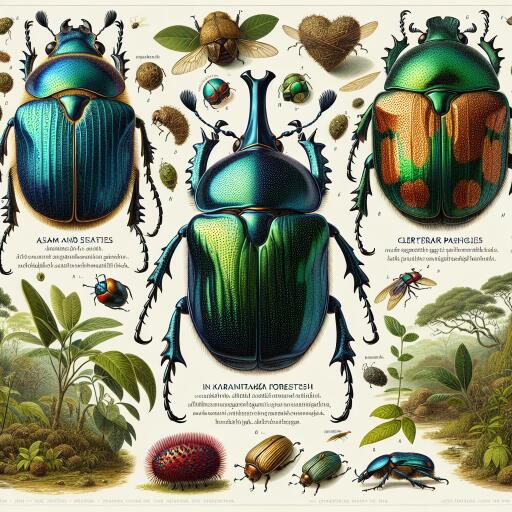
Unveiling New Dung Beetle Species in India’s Rich Ecosystems
In the lush landscapes of Assam and Karnataka, researchers have made a ground-breaking discovery, unveiling three new species of dung beetles, which are pivotal for the health of our ecosystems. These species, identified as Onitis bhomorensis found in Assam, alongside Onitis kethai and Onitis visthara discovered in Karnataka, spotlight the ecological diversity and richness of India’s fauna.
The discovery is a result of painstaking research conducted over two decades, aiming to catalogue the insect biodiversity within India. Such work is vital for highlighting the crucial roles these species play in ecosystem services, such as nutrient cycling, soil aeration, and seed dispersal. Moreover, the beetles are essential in decomposing dung, thereby mantaining the balance and health of their environments.
In addition to these three new species, the research team has brought to light the presence of Onitis bordati in the forests of Meghalaya, marking the species’ first recorded appearance on the Indian subcontinent. Previously, Onitis bordati was only known to inhabit Vietnam and Thailand, making this discovery a significant expansion of its known range.
The findings underscore the critical necessity of habitat preservation, particularly in India’s northeastern regions, renowned for their biodiversity. Notably, the Brahmaputra River’s floodplains and its sand banks, or ‘saporis’, serve as a haven for a myriad of species, including the newly identified Onitis bhomorensis. These areas are not only biologically diverse but also play an indispensable role in flood control and soil fertility. However, they face threats from increasing development and encroachment, putting these vital ecosystems at risk.
The role of dung beetles extends far beyond the decomposition of dung. They are instrumental in nutrient cycling, propelling soil aeration and facilitating seed dispersal. Their activities contribute significantly to the maintenance of healthy, functioning ecosystems. Ahead of these discoveries, the global catalogue of Onitis species stood at 176. Notably, all species within this genus are categorized as tunnellers; they bury dung beneath the surface to nourish their larvae—a fascinating example of nature’s intricacies.
These discoveries not only enrich our understanding of India’s ecological diversity but also stress the importance of ongoing conservation efforts. Protecting these fragile habitats ensures the survival of countless species and maintains the ecological balance critical to our planet’s health. As researchers continue to explore and uncover the hidden treasures of the natural world, their findings remind us of the complex interdependencies that sustain life on Earth.
The research, spearheaded by a team dedicated to the study of biodiversity, underscores the imperative of conservation in areas renowned for their ecological fragility. Their work, contributing to the ever-expanding lexicon of species, emphasizes how much remains to be discovered and understood in the natural world. With each discovery, the significance of preserving our planet’s diverse habitats is made ever more apparent, spotlighting the role of every organism, no matter how small, in the intricate web of life.





Leave a Reply